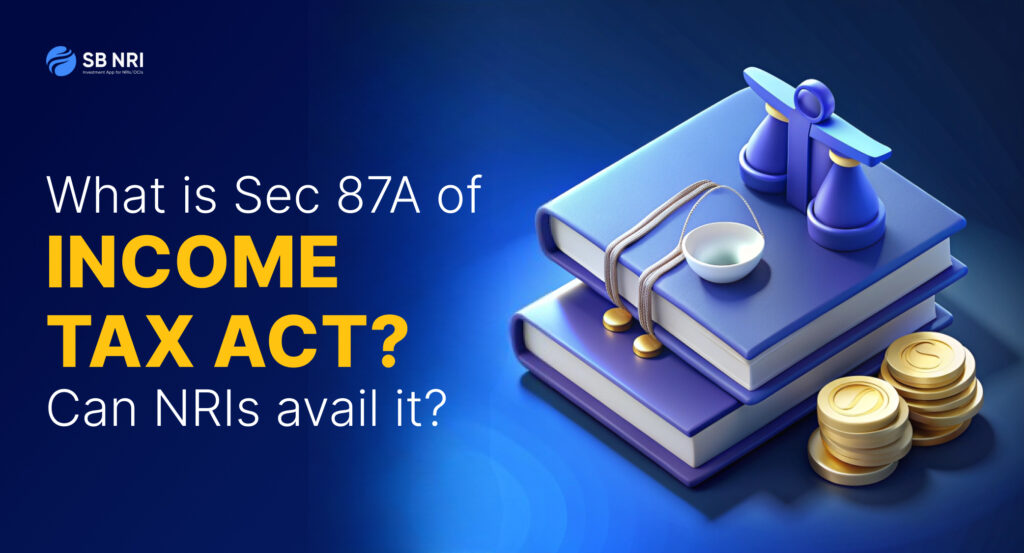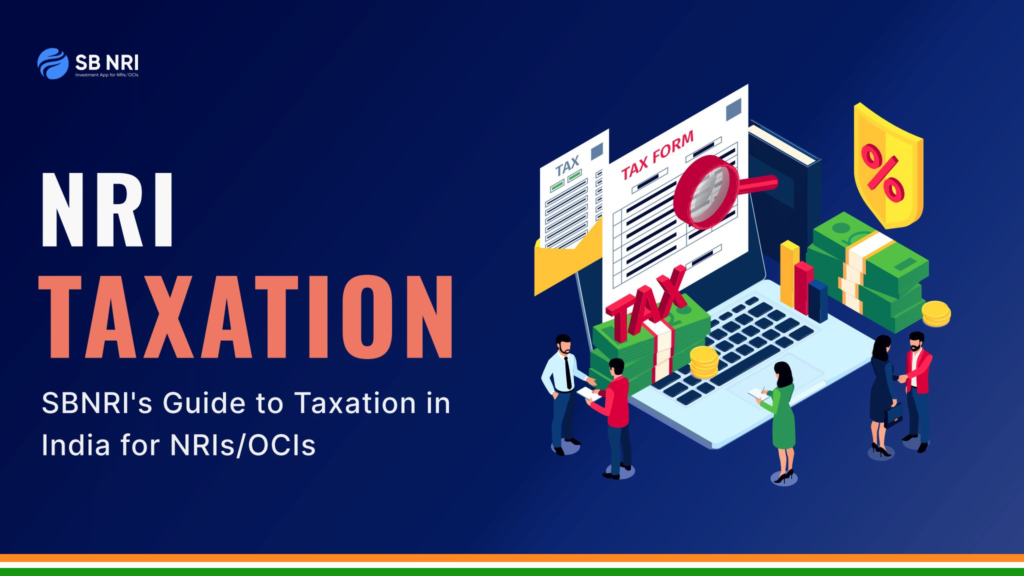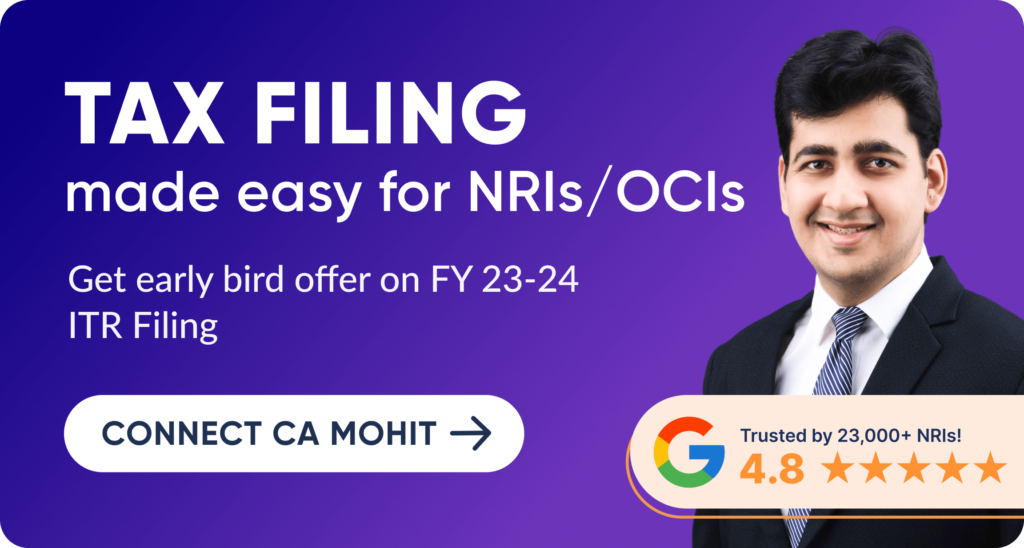
When it comes to Income tax slabs and tax rates, you know about the basic exemption limit of Rs 2.5 lakh in the old tax regime and Rs 3 lakh in the new tax regime. What if we say you don’t have to pay any tax on your income after deductions of Rs 5 lakhs for the old regime and Rs 7 lakhs for the new regime? Yes, it is possible due to Section 87A of the Income Tax Act. Find out all you need to know about Sec 87A of the Income Tax Act, rebates allowed under Sec 87A, and whether Non-Resident Indians (NRI) or Overseas Citizen of India (OCI) can avail Sec 87A benefits in this blog.
What is Sec 87A of the Income Tax Act?
Individual taxpayers are eligible for a refund under Section 87A of the Income Tax Act if their total taxable income for a particular fiscal year does not exceed Rs. 5,00,000 for the old regime and Rs 7 lakhs in the new regime. Introduced in 2013 and revised in 2019, and further revised in FY 23-24, this section allows eligible taxpayers rebate on their tax reducing their tax liability to zero. Here’s how it works:
- Old Tax Regime: The rebate is 100% of income tax or ₹12,500, whichever is lower, for incomes up to ₹5 lakh.
- New Tax Regime: The rebate is 100% of income tax or ₹25,000, whichever is lower, for incomes up to ₹7 lakh.
Also read: ITR Filing for NRIs AY 2024-25: Step-by-Step ITR Filing Process
Who can avail Rebate under Sec 87A?
There are several criteria that an individual needs to meet to be eligible to claim rebate like:
- You are a resident of India.
- Your total income after Chapter VI-A reductions (like Section 80C, 80D) does not exceed Rs 5 lakh.
- The limitation of the rebate is Rs 12,500 under the old tax regime and Rs 25,000 under the new regime. If your tax liability is under that amount, you won’t pay any tax.
- Senior citizens (60-80 years) can claim the rebate.
- Super senior citizens (above 80 years) are not eligible
Also read: New vs Old Tax Regime: Which is better for NRIs/OCIs
What is the Limit of Rebate under Sec 87A?
A resident Indian is eligible for a refund under Section 87A of the Income Tax Act if their total income for a financial year is Rs. 5 lakh or less in the old regime and Rs 7 lakhs for less in the old regime, based on the current income tax slab rates. A maximum deduction of 100% of the income tax payable, up to Rs. 12,500 for the old regime, and Rs 25,000 for the new regime is permitted under this rebate.
Also read: 5 Tips for NRIs Filing Income Tax Returns in India
How does Sec 87A of the Income Tax Act work?
Section 87A of the Income Tax Act provides a rebate for resident individuals whose total income does not exceed a specified threshold. This rebate directly reduces the income tax payable, making it an effective way to lower the tax burden for individuals in lower income brackets. For the financial year 2023-24, under the old tax regime, the rebate is available for individuals with a total income of up to ₹5 lakh, offering a rebate of 100% of income tax or ₹12,500, whichever is lower. Under the new tax regime, the rebate applies to incomes up to ₹7 lakh, providing a rebate of 100% of income tax or ₹25,000, whichever is lower.
Also read: Penalty for Non-filing of ITR by Due Date: Know all the Rules
Rebate under the Old Tax Regime
The following table illustrates how the rebate under Section 87A is applied for different income levels under the old tax regime for the financial year 2023-24. The rebate is available for individuals with total income up to ₹5 lakh, providing a maximum rebate of ₹12,500.
| Income | Tax Before Rebate | Rebate under Sec 87A | Tax After Rebate |
| ₹4,50,000 | ₹10,000 | ₹10,000 | ₹0 |
| ₹5,00,000 | ₹12,500 | ₹12,500 | ₹0 |
| ₹5,50,000 | ₹22,500 | ₹0 | ₹22,500 |
| ₹6,00,000 | ₹32,500 | ₹0 | ₹32,500 |
| ₹7,00,000 | ₹52,500 | ₹0 | ₹52,500 |
Rebate under the New Tax Regime
The following table illustrates how the rebate under Section 87A is applied for different income levels under the new tax regime for the financial year 2023-24. The rebate is available for individuals with total income up to ₹7 lakh, providing a maximum rebate of ₹25,000.
| Income | Tax Before Rebate | Rebate under Sec 87A | Tax After Rebate |
| ₹4,50,000 | ₹10,000 | ₹10,000 | ₹0 |
| ₹5,00,000 | ₹12,500 | ₹12,500 | ₹0 |
| ₹6,00,000 | ₹20,000 | ₹20,000 | ₹0 |
| ₹7,00,000 | ₹25,000 | ₹25,000 | ₹0 |
| ₹8,00,000 | ₹35,000 | ₹0 | ₹35,000 |
Things to consider:
- Under the old tax regime, the rebate is capped at ₹12,500 for incomes up to ₹5 lakh.
- Under the new tax regime, the rebate is capped at ₹25,000 for incomes up to ₹7 lakh.
- For incomes above the respective thresholds, no rebate is available, and the full tax liability applies.
Also read: NRI Income Tax Slab Rates for FY 2023-24 (AY 2024-25)
Can NRIs avail Rebate under Sec 87A?
No, this rebate is only for resident individuals of India. That is why, taxpayers qualifying as non-residents are not eligible for a rebate under 87A. Rebate under 87A is for resident individuals earning income of 5 lakh or less in the old regime and Rs 7 lakhs or less in the new regime, this is to make their life a little easier and help them save money.
Also read: New Rules for NRI Taxation in India FY-2023-24
How can NRIs reduce their taxation?
Since NRIs cannot avail themselves of the rebate under Section 87A, they need to plan their taxes accordingly. NRIs are subject to tax on income earned or accrued in India, such as rental income, interest on bank deposits, and capital gains from the sale of property or investments in India. They should leverage other applicable provisions and deductions under the Income Tax Act to minimize their tax liability.
Also read: What is Section 54F of Income Tax Act? How can NRIs benefit from it?
Wrapping up
Section 87A of the Income Tax Act offers a valuable rebate to resident individuals, reducing their tax liability significantly if their total income falls within the specified thresholds. However, NRIs cannot benefit from this rebate, as it is exclusive to resident taxpayers. NRIs must explore other deductions and exemptions available to them to optimize their tax obligations in India.
Also Read: 5 Ways to save on the tax NRIs have to pay
Calculate your TDS Refund with SBNRI’s TDS Refund Calculator
A TDS refund is the process of reclaiming the excess tax deducted at source by the payer if the actual tax liability of the taxpayer is lower than the TDS deducted. This situation typically arises when the income tax calculated on the total income is less than the TDS already deducted. To claim a TDS refund, taxpayers need to file an income tax return (ITR). The Income Tax Department processes the ITR and verifies the details. If the tax department finds that the TDS paid is more than the actual tax liability, the excess amount is refunded to the taxpayer.
You can easily find out how much tax refund you can get by calculating your TDS Refund from this TDS Refund Calculator.
Access SBNRI’s Exclusive NRI Taxation Guide

NRIs and OCIs can now access SBNRI’s exclusive NRI Taxation Guide covering in-depth information about DTAA, Gift Tax, Rental Income Tax, ITR Filing, Types of ITR Forms for NRIs, Capital Gain Tax, Income Tax, and more. The report will help you understand India taxation on mutual funds, other asset classes and how you can comply with the regulations.
Access NRI Taxation Guide here
Looking for NRI ITR Filing? Connect with SBNRI NRI Tax Expert CA Today!

At SBNRI, we have simplified ITR filing for NRIs/OCIs through a smooth digital journey. Be it Basic Filing, Advanced Filing (includes Capital Gain, etc.), or Premium Filing (Foreign Income), we can help you assess the right computation and lower your tax liability.
“We’ve helped over 500+ NRIs/OCIs file ITR returns and more than 25,000+ across other taxation services last financial year and we’d love to help you out too”
You can download SBNRI App or connect with NRI Tax Expert team directly via the button below.
FAQs
Is 87A rebate available for NRI?
No, this rebate is only eligible for resident individuals.As, taxpayers qualifying as non-residents are not eligible for a rebate under 87A.
How to calculate the rebate under Section 87A?
To calculate the rebate under Section 87A:
- Calculate your gross income.
- Subtract deductions available under chapter VI-A in the old regime or applicable deductions for the new regime.
- If your net taxable income is less than Rs. 5 lakhs for the old regime or Rs 7 lakhs for the new regime, you are eligible for the rebate.
The rebate is up to Rs. 12,500 on the tax payable before adding health and education cess.
Can one claim a rebate under section 87A after they have paid their taxes for an FY?
You can claim a rebate under Section 87A when filing your tax return, even if you have already paid the taxes.
Is 87A rebate available on agricultural income?
Yes, resident individuals earning from agricultural sources can also claim a tax rebate under Section 87A.



